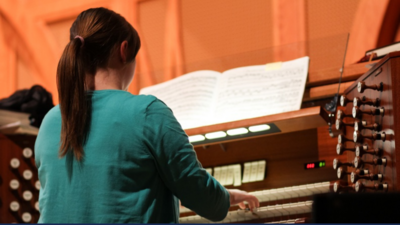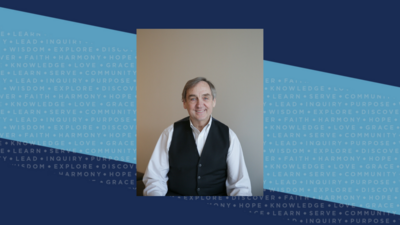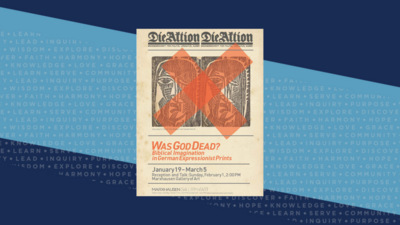What Are Applied Music Lessons?

There is always music playing at Concordia University, Nebraska. This year, the music is more contained to one place – the Borland Center for Music and Theatre – but nevertheless, it is a fixture at Concordia. At any given moment, you may be able to find students practicing organ, piano or any variety of instruments in a practice room, a choir warming up, or a handbell choir ringing joyfully. Many of the students involved in these activities also participate in applied music lessons – but what are applied music lessons, and how do they work at Concordia?
At Concordia, “applied music” courses generally refer to private lessons given by professors who are highly skilled in the performance of certain instruments. As of the 2023-24 academic year, Concordia offers applied music lessons on eighteen different instruments, as well as voice lessons and classes in music composition and service playing, all of which fall under the category of “applied music.”
Signing up for applied music lessons is simple: students can follow the same instructions as outlined in this recent article to add a music lesson to their schedule. Most students take music lessons for a single credit; music majors may choose to take them for two credits.
Concordia offers private lessons on each instrument, except for guitar, piano and voice (for which the first-level lesson is a beginning group class), at four levels. Many students take one level of a lesson per year, but should communicate with their advisor and applied lesson professor about any previous experience they have so that they are placed in the correct level.
Jackson Munter, a junior majoring in music education and taking applied music lessons in trombone and organ, said: “My private lesson experience here at Concordia has been very positive.” He also spoke highly of Dr. Kevin Madden, low brass instructor. “My trombone lessons have been great. Dr. Madden is very kind, knowledgeable and flexible. We have gotten through a lot of literature, worked on ensemble playing and worked especially on fundamentals.”
Although students who major or minor in music are required to take applied music lessons, many students who are not enrolled in music programs also choose to learn more about a specific instrument by enrolling in these lessons. Sophomore Adah Pflughoeft, an English major, is taking piano lessons this semester: “I think the applied music lessons available at Concordia are a great opportunity for all students, even those who are not majoring in music,” she said. “Music lessons are a great way to build skills while doing something you enjoy – not to mention that the new music building is such a cool place to get to practice!”
Any student at Concordia, regardless of their declaration of a major, can receive music scholarships. Non-music majors who participate in an ensemble and enroll in an applied music lesson can receive $4,000 in annual participation scholarships, provided they remain enrolled in these two areas.
Students who are pursuing a B.Mus. in church music or music education, or a B.A. in music must submit an audition video to Concordia, which automatically places them under consideration for a full-tuition scholarship if they submit their video before October 31 of the year prior to their matriculation. Other music majors receive over $5,000 in scholarships as a result of their chosen major.
Grace Donnelly, a sophomore music education major, reflected on her experience in applied music lessons at Concordia: “Taking applied music lessons is one of the many ways to be involved in music on campus. I am a music major, but in addition to this, I am taking lessons besides my primary instrument. It’s a great way to get one-on-one feedback and keeps me accountable.”
Concordia’s music faculty includes over twenty full-time and adjunct professors, each with their own area of expertise and a fluency in the art that allows them to share their knowledge and talents with hundreds of Concordia students each year. “Dr. Blersch [organ and music theory professor] is a fantastic teacher,” said Munter. “[He] is extremely knowledgeable in the art of organ playing, in music theory, and in the art of teaching as well.” Dr. Jeffrey Blersch is just one of many members of Concordia’s skilled music faculty.
In addition, Concordia dedicated its new music facility, the Borland Center for Music and Theatre in September 2023. The 46,544 square foot building houses a recital hall, 22 practice rooms, teaching studios, floor-to-ceiling windows in several rooms, and a variety of classrooms and teaching studios. The Borland Center offers music students taking applied lessons an unprecedented opportunity to practice and perform in its spacious modern facilities that are a new and exciting addition to campus.
As for Concordia’s students involved in music, they offer anyone considering applied lessons some advice: “Taking applied music lessons at Concordia,” says sophomore biology major Eliya Moldenhauer, “brings balance and joy to the everyday life of a college student...one of my biggest pieces of advice to future students considering taking music lessons is to prioritize your practice time. Not only will it improve your music skills and performance, it will also aid you in your other studies by adding variety and purpose to your workload.”
Donnelly offered a piece of advice as well: “Get out of your comfort zone. If you haven’t played an instrument in a long time, that’s okay. Better yet, learn something you’ve never done before, but always wanted to. Now is your chance to commit. Practice makes better.”
Want to learn more about studying music at Concordia University, Nebraska? Click here.
Related Stories


